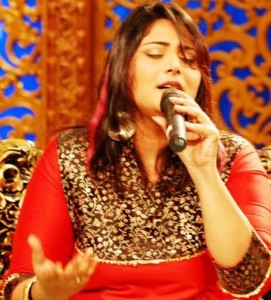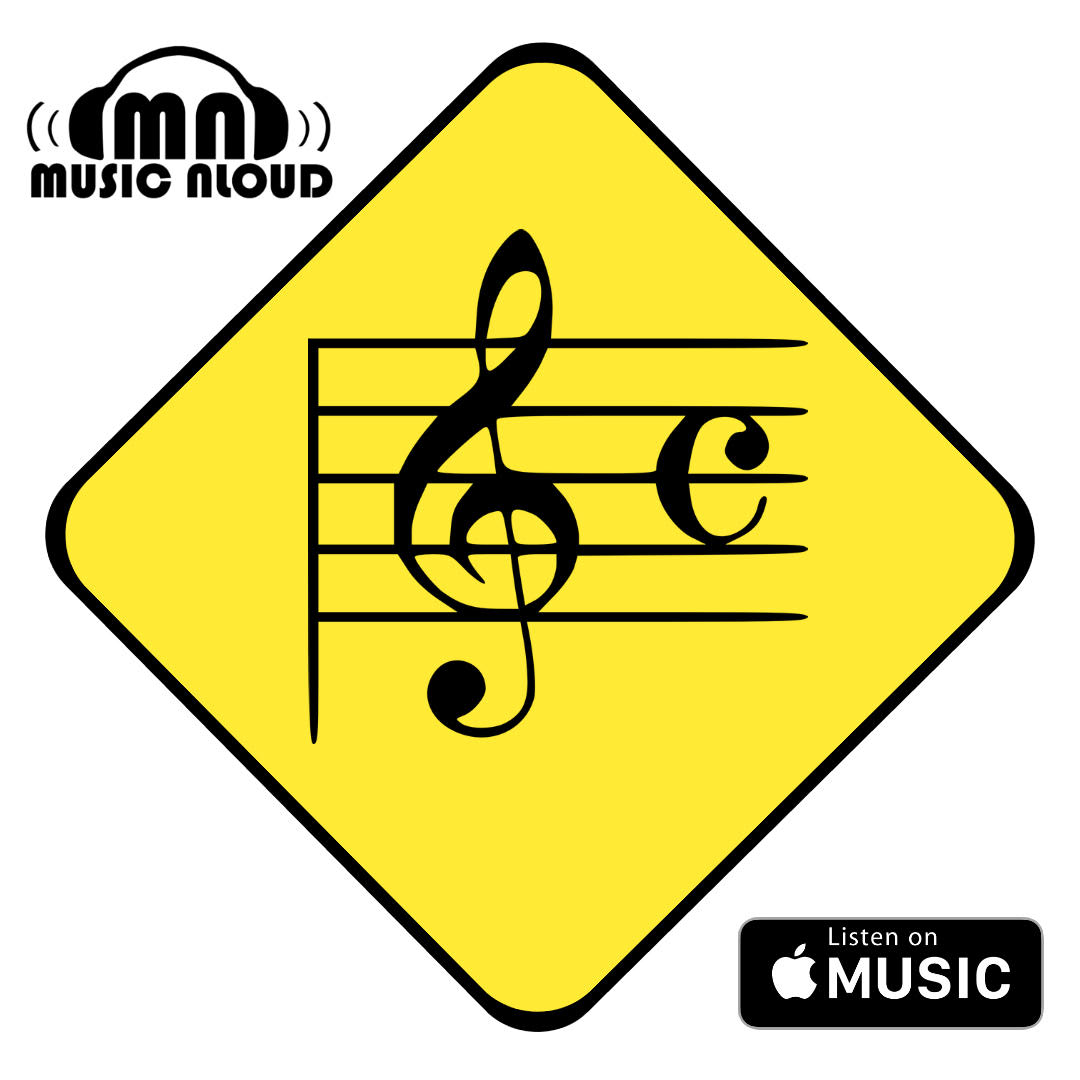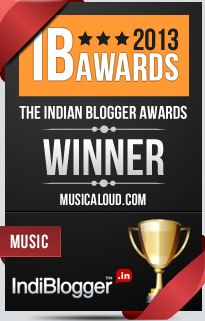 An established ghazal singer, she debuted in Bollywood with Sandesh Shandilya’s Uff Kya Jadoo Mohabbat Hai. But her big break had to wait till A R Rahman gave her the title song of Jaane Tu Ya Jaane Naa. We bring you Runa Rizvi as she talks to Music Aloud about her career, ARR, and her upcoming projects.
An established ghazal singer, she debuted in Bollywood with Sandesh Shandilya’s Uff Kya Jadoo Mohabbat Hai. But her big break had to wait till A R Rahman gave her the title song of Jaane Tu Ya Jaane Naa. We bring you Runa Rizvi as she talks to Music Aloud about her career, ARR, and her upcoming projects.
You are quite lucky I would say, to have both of your parents as established singers. So I am guessing your musical training must have all happened in-house? Could you take us through a bit of that? Your musical upbringing?
Yes. I feel absolutely grateful to God to have placed me in a musical home with great understanding parents who never imposed anything on us but let us choose our own journey through music & life. My father Ustad Rajkumar Rizvi – a Ghazal Maestro (known as the Mehndi Hassan of India) and mother Smt Indrani Rizvi a PhD in music both have been great pillars of strength in making me realize my dream and my passion for music. My father hails from Kalavant Gharana aka Seniya Gharana (the Gharana of Tansen) and my mother is originally from Kolkata – a Bengali beauty born and raised in Delhi in a family with Army & Defense Background . In short I am a deadly combination of Rajasthani Muslim Father and a Bengali Brahman Mother. My father started my training when I was 6 and he says he knew I had the zest in my voice when he first heard me sing the first Sa . Both my parents have been strict about my and my younger sisters’ Riyaz right from our childhood. I remember as kids our training included rigorous practice of classical raags and bandish, ghazal gayaki, thumri and folk. It was later in my teens that I started experimenting more with different genres of music and when you are trained in classical it’s much easier or rather interesting to adopt different genres with equal elan. I took some jazz lessons while on tours with dad to the US for his workshops and performances and later formed a small band where we would have jam sessions with jazz musicians and I would sing some sufi, ghazal, folk and jazz too. Till today when on stage or while teaching my father is first my GURU then my father . He is the teacher who shows me the path and mother is the strength that pushes me forward.
Though you started your singing in Bollywood with Uff Kya Jadoo Mohabbat Hai, the song where people really noticed you was the title song of Jaane Tu Ya Jaane Na. So how did you land up that dream offer, of working with A R Rahman?
Yes my debut was Uff Kya Jadoo Mohobbat Hai from Rajshri Productions and I think that was the most important and learning experiences of my first step in the music world. Its definitely close to my heart as it was my introduction to a recording microphone and the technicalities that a playback singer needs to learn. I must add here that it was quite a challenging experience but everybody right from the producer, the thoughtful Mr. Rajat Barjatya to my music director Sandesh Shandilya ji were very co-operative. I remember asking Sunidhi (who sang the title track in the movie then) when I met her at the studio, a few tips about singing correctly with the right throw on the recording mic and she was very helpful and supportive and assured me saying that no matter how long to takes to sing a song don’t forget you have sung it in the end with a lot of hard work. Later I worked with other artists too like Leslie Lewis, Bappi da etc. but then got busy assisting father in his music school and conducting workshops with him. One day a dear friend of my family heard me at a get together and recommended my name to Rahman sir as he was also Looking for a Punjabi folk voice for a project called Provoked by Jagmohan Mundra . So technically Provoked was my first work with Rahman sir . I did backing vocals, Alaaps and a few couplets for that movie.
How was the experience of working with Rahman? Especially since the song was something not quite along your regular line of semiclassical songs?
This is a myth I want to break in the industry – a classical /semi-classical singer can only sing that particular genre. I love hip hop, R&B, blues, jazz, country etc and when I sing those I don’t think anyone would be able to point out that I am from a Classical background. So I am here to sing all genres I can and the deal is I want to make it sound mine when I do it.
About Rahman Sir – I can fall short of words writing about Sir and his humility. I met him the first time In Chennai at his studio around 2.00 am in the morning. He is indeed the simplest guy I’ve met. I clearly remember having a very bad throat that day as I was all nervous and excited to see him. But the moment he walked into the studio he made sure I was at ease and asked me to sing something I was comfortable in I sang a sufi punjabi no. Then I requested him that I would like to sing a Western song too. He heard me out and just said OK Take. And we finished the recording through the night. After a few months I get a call again from Chennai and before I knew it I was sitting with Abbas Tyrewala and Rahman sir learning Jaane Tu in the studio (This time it was 3.00 am). When I sang the song it was all just a simple loop and Sir was on the keyboard guiding me through. I couldn’t believe it when I heard the song later! He is truly a musical genius. Jaane Tu is an achievement of my life. The one thing I completely admire about Sir which I also follow in my life is – His Music is his God. God bless him.
I once asked him about the inspiration behind his music that makes him stand out of the ordinary. He just said, “Every song I create is like my first song”. Thats the passion he has for music. I am blessed to have had the opportunity to have worked with him and have learnt to become a better musician and more than that a better person.
The last Bollywood song you sang was for Bapi-Tutul in Agyaat, early last year. Why no songs after that? Did the temptation of ghazals prove too strong? 🙂
Before Agyaat I did a title track for Ram Gopal VErma’s Contract and also sang a beautiful blues no for the very innovative Bapi Tutul in a movie named Katputli. I recently did the main IPL song (Saare Jahna Se Accha) by Set max. Ghazal gayaki is something which will always be in me as a strong point and something I am really proud about as its a part of my Musical heritage. Not many young artists attempt to take up ghazals as it has a lot of intricate variations and needs a very balanced gayaki andaaz. But having said that, I do change my style as per my performances, for some groups I only perform Ghazals and Sufi style whereas in some concerts I do a complete Bollywood, or sometimes jam to a jazz session. Of course singing in a particular genre is great if you are comfortable in it and it brings out the best in you but I think its high time we looked at a wider prospective of versatile singing. Why not reach out for more, if you have it in you.
What are your current projects? Any private album in the offing?
I am working on a project with Sanjay Leela Bhansali Sir and another one with Shyam Benegal ji along with a few other projects. Recently I have been collaborating with international artists like Prem Joshua and Bandish Projekt. I am also a part of a classical fusion band VIBGYOR with some brilliant classical artists like Vijay Ghate, Rakesh Chaurasia, Sridhar ji & Ratish Tagde. And yes I am working on my album as a singer/songwriter/composer. My desire is to get all the shades of Runa into it.
I remember reviewing Suhel Khan’s ghazal album called Jazbah early last year. Though it was a good piece of work, I doubt many people heard it. As an established classical singer, what is your take on this? Do you think there is still a fair bit of following for ghazals and other classical/semiclassical genres?
First of all may I request you to just address me as a singer and not a classical singer. Thats too high a reputation which I don’t think I have reached. About ghazals I think ghazals and semi classical form is a fading art which we should preserve and protect for our future generations. Of course this genre has a limited and a very dedicated fan following but its the youth that need to get involved and interested into this beautifully soulful form of music. The literal meaning of Ghazal is to converse with the beloved. So something that talks about love and pain and soul in a form of poetic couplets can be pretty intriguing if one understands the sensitivity of the melody along with the words. I guess its more about being sensitive or more affectionate about life in general & that only follows with age and experience. If you notice an Iktara or Mora Saiya or a Sajdaa does a greater job than a pop no because as Indians we still believe in soul and melody. So I believe followers of any genre would definitely love to listen to melodious music with meaningful poetic renditions, though not essentially in the ghazal format.
Who are your idols? Is there any artist you long to work with?
My first idols are of course my GURU – my parents. Also I am grateful to God that I have had the privilege to share the stage with many great Legends like Ustad Mehndi Hassan Khansaab, Sri Hari Prasad Chaurasia ji, Jagjit Singh ji & Ghulam Ali Ji. The two legends I wanted to work with were Ustad Nusrat Fateh Ali Khansaheb and the one and only Michael Jackson. They have been such an inspiration. In future I wish to perform and work with AR.Rahman sir, Shankar Mahadevan, Sivamani, Ilaya Raja, MM Kreem, Shlomo( U.K Beat Box artist), Amit Trivedi, Akon and Mariah Carey.



